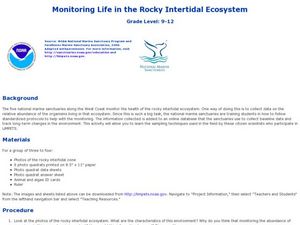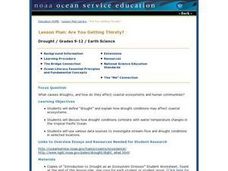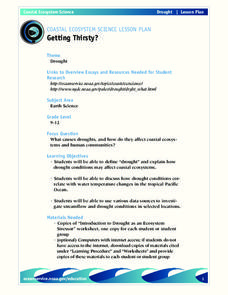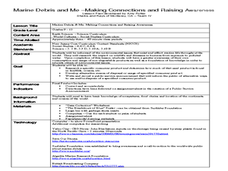Consortium for Ocean Science Exploration and Engagement (COSEE)
Life in an Ocean World
How does the shell color of crabs and the habitat they live in impact the predator-prey relationship? The fourth activity in a series of five is a game where participants try not to get eaten if they are a prey and try to eat if they are...
PBS
Symbiotic Strategies: The Secret Lives of Sharks and Rays
Learners investigate the interaction in an oceanic ecosystem. For this symbiotic relationship lesson, high schoolers investigate how ecological relationships evolve over long periods of time in order to maintain balance and stability of...
Consortium for Ocean Science Exploration and Engagement (COSEE)
Arctic Smorgasbord
Though the walrus spends roughly one third of its time on land, it eats organisms that live on the bottom of the ocean. The first in a series of five, the lesson uses a variety of plant and animal cards to have scholars build an arctic...
Curated OER
Monitoring Life In The Rocky Intertidal Ecosystem
High schoolers investigate marine life by researching aquatic organisms on the Internet. In this oceanography lesson, students monitor algae and animals of the ocean by identifying their population and habitat on data sheet ID cards....
NOAA
Through Robot Eyes
How do robots assist ocean explorers in collecting data and images? The final installment in a five-part series has science scholars examine underwater images collected by robots and identify the organisms shown. Groups then calculate...
Polar Trec
Bering Sea Fabulous Food Chain Game
In spring, the Bering Sea turns green due to phytoplankton, which live at the surface, experiencing a population explosion. Groups of scholars play a food chain game, writing down food chains as the game is played. After five to six...
NOAA
A Quest for Anomalies
Sometimes scientists learn more from unexpected findings than from routine analysis! Junior oceanographers dive deep to explore hydrothermal vent communities in the fourth lesson in a series of five. Scholars examine data and look for...
Curated OER
Climate Change Challenge
Students participate in a demonstration in which they role-play polar bears and habitat components to demonstrate the impacts of climate change on the Arctic Ocean ecosystem.
University of California
Energy and Biomass Pyramids
Young scientists play tag as they act out the food pyramid in the ocean ecosystem. Energy circles pass from the smaller prey to the predators and at the end of the activity, a data chart and analysis questions allow pupils to apply their...
Curated OER
Sea Connections: Marine Ecosystems
Young scholars identify producers and consumers from marine ecosystems and describe the balance among them in the environments. After constructing a food chain from a marine ecosystem, they examine human activities that can upset the...
Curated OER
Graphing Iron Data
Learners apply a data set to create a graph show how iron ore impacts an ecosystem. They explain how the iron effects the distribution and abundance of phytoplankton in coastal ecosystems using spreadsheet software.
NOAA
Exploring Potential Human Impacts
Arctic sea ice reflects 80 percent of sunlight, striking it back into space; with sea ice melting, the world's oceans become warmer, which furthers global warming. These activities explore how humans are impacting ecosystems around the...
Florida International University
Are You Concentrating?
Explore the importance of a concentration gradient in the rates of dissolution. Using the ocean ecosystem, learners study rates of dissolution around coral reefs. A hands-on experiment helps individuals discover the effects of changing a...
Curated OER
It Looks Like Champagne
Students determine some practical implications of the discovery of liquid carbon dioxide in deep-ocean ecosystems. They interpret phase diagrams and explain the meaning of "critical point" and "triple point."
Curated OER
Kure Waste Chase Game Lesson
Students work together to identify marine debris. They explain the effect of the debris on various ecosystems. They draw different types of ocean currents as well.
Polar Trec
Plankton Parents
Plankton are so abundant in the ocean they outweigh all of the animals in the sea. In this three day activity, groups discuss and become familiar with plankton, capture females, and look for egg production on day three.
Curated OER
Are You Getting Thirsty?
Learners study droughts and how they affect communities and coastal ecosystems. In this ecosystems lesson students use data to examine drought conditions in certain areas.
Curated OER
Getting Thirsty?
High schoolers explore the concept of drought and its significance as a natural hazard. In this drought lesson plan, students complete 13 questions on an "Introduction to Drought as an Ecosystem Stressor" worksheet and discuss the...
Curated OER
Who Has the Data? Monitoring Coral Reefs
Learners access data to characterize coral reefs. For this scientific research lesson, students access data and explain the need for such data when monitoring coral reefs. They will identify and explain three major threats to coral reefs.
Curated OER
2005 Hidden Ocean Expedition What's Eating You?
Analyze data and make inferences about the trophic position of organisms in the Canada marine food web. After a review of the geography and formula, discuss results and write an essay to improve the understanding of Artic food webs.
Florida International University
Design Your Own
Apply scientific principles to designing an experiment to study organisms living on the coral reef in our oceans. Through reading, individuals learn about the coral reef ecosystem and important factors that affect its function. Using the...
Consortium for Ocean Science Exploration and Engagement (COSEE)
Understanding the Food Web
Building on prior knowledge of the pervious lesson in the series, pupils explain the previous lesson to each other. Then they write a simple guide for a young child to read on the same topic.
Curated OER
Marine Debris and Me
Students study the environmental issues that pertain to the marine environment. In this research ocean landfills lesson students come up with alternative means of disposal.
Curated OER
Exploring the Beach
Students explore the beach. In this marine habitat lesson, students inspect sand grains, design beach profiles, classify marine life, and examine natural beach habitats. Students use spreadsheets to record data from their activities at a...

























